LEATHERLAND LIVES 1900 - 2000
My great-great grandfather Samuel Leatherland had twelve children surviving to adulthood, all born and brought up in the village of Churchover. Most left home at an early age and most of the family dispersed to various parts of the England and Scotland. I will now look at the lives of some of their descendants during the twentieth century, my three great uncles : Will, Arthur and John, and my grandfather Charles.
Brought up in Birmingham and their childhood marred by the early death of their mother, the Leatherland boys all grew up to have successful careers and lives. Like many Brummies, three of them worked for Cadburys at various times, in fact Arthur and Will made their careers with the chocolate makers.
Funnily enough, despite the fact that John Edward and Elizabeth had four sons, there is only one male Leatherland line remaining (my cousin Harvey and his son Charles - now Charlotte).
JOHN HENRY LEATHERLAND (known as JH or Harry)
John Henry Leatherland was my great uncle. Much of the following information came from a "This is Your Life" presentation by his son Harvey and cousin, Derek King, at his 90th birthday party.
He was born in Harborne, Birmingham in 1907. His mother, Elizabeth Leatherland (nee Abbis) died when he was a year and ten months old.
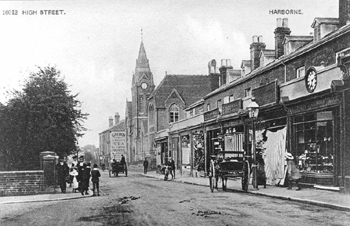
Harborne High Street (1904)
John went to Harborne Infants School. As a boy he had part time morning jobs before school in various wealthy Birmingham families' homes. One was for the Rahone family in Edgbaston. Mr Rahone ran a business making engineers' measurement tools.
John attended Selly Oak secondary school which was eventually taken over as a hospital for soldiers wounded in the First World War. He was a talented pupil and excelled at debating at school. He represented the school in a Birmingham City History competition. Indeed he so distinguished himself in arithmetic that he was asked to mark the other pupils' work ! His stepmother did not believe in play, so John became an expert in cleaning windows and brass.
John left school at 14, the usual school leaving age in those days. He began working at Cadburys in Bournville in the production department, passing moulds for chocolate in the block chocolate moulding shop. On passing the Cadburys office exam, he moved to the Sick Benefit Office. By the early 1920s he had left home and lived in lodgings with a Mrs Reason, a widow in Stirchley, paying 25 shillings [£1-25] a week. The lodgings were so pleasant that John's brother Will came to stay there too.
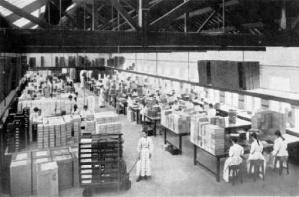
The Packing Room at Cadburys Bournville factory
John continued his education at Cadburys who, as very enlightened employers, ran education classes for employees. He attended day classes and went to evening classes several times a week studying book-keeping, maths and elementary economics. Although having little enthusiasm for the business side of Cadburys, he became interested in the welfare and personnel side of the company and at the age of 18 joined their Employment department as a clerk.
Continuing his evening class studies, John gained a place at Ruskin College, Oxford - the first member of the family ever to study at university. Ruskin was a working man's college and John studied there for a year gaining a diploma in economics and political science. The cost was funded by Cadburys.
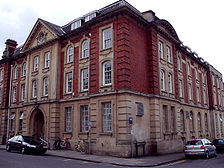
Ruskin College, Oxford
John met a young lady called Florence Moulton who worked in the chocolate dipping department at Cadburys. In 1926 they went youth hostelling together down the Rhine in Germany. They became good friends but in 1927 Florence left Cadburys to become an infant and maternity nurse in the south east and the outskirts of London. In 1933 they married and settled in Kings Norton, Birmingham. Three years later their son Harvey was born and they moved to Worcestershire.
During the Second World War, John became Labour Manager at a Cadbury's factory in Blackpole, Worcester. At the end of the War he left Cadburys and became Personnel Manager for Tube Investments in the Black Country. In the late 1940s he joined Halex, a plastics manufacturing company and moved to Loughton, Essex.
Halex was part of British Xylonite who developed the first artificially made commercial plastic. In 1949 John became Personnel manager of BX Plastics at Larkswood, Chingford. He was a very active personnel manager and revived the social activities of Halex starting (amongst other things) the annual dance, the sports day, a horticultural and handicraft show, and table tennis and darts clubs.
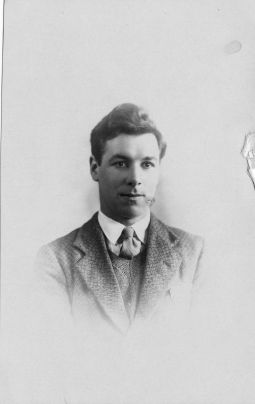
John Leatherland
In 1959 John survived a heart attack. The following year he took on personnel responsibilities at British Xylonite and became Group Personnel Director in 1962.
The Plastics Historical Society has a website www.plasticquarian.comwhich includes an article written by John Leatherland for the Society in 2002 in whicdh he explains his involvment with the company and some of the history of Halex and British Xylonite. See www.plastiquarian.com/styr3n3/pqs/pq28.htm
John and Florence lived in a large house in Lower Park Road, Loughton which had a big garden. He decided to build a new chalet bunglow in the garden and eventually sold the original house.
In 1965 his son Harvey married and two years later his grandson Charles was born. Charles went to live with his grandparents as a boy. He later went to art school and became a successful draughtsperson, designer and art director in the film industry.
John retired in 1972. Shortly afterwards Florence became ill and they decided to move to a bunglow in Sawbridgeworth, Essex. John cared for Florence for many years during her illness but sadly she died in 1980. John then moved to a bunglow in Ongar. He maintained a busy lifestyle not only decorating and renovating the garden, but becoming a meals on wheels helper and involving himself in many community activities. He was a good cook and became famous for his home made chocolate.
John remained active well into his 90s. He died at the 98 in 2005.
ARTHUR SAMUEL LEATHERLAND (known as Sam)
Arthur was educated at Station Road Council School, Harborne. After leaving school at the age of 14 he joined Cadburys in Bourneville, Birmingham and then worked for Cadburys at Frampton in the west of England in their filling shop and as a milk condenser. He became a foreman in charge of several hundred employees.
He was awarded a scholarship to Fircroft College in 1925 and appointed as Foreman in 1937 at Knighton. During WW2 he worked at the Royal Ordnance factory at Swynnerton becoming Group Manager. He returned to Frampton as Senior Foreman in 1951. He became an expert in milk factory workings and helped to establish Cadburys' milk factory in Ireland.
An article in the Cadburys magazine to mark his retirement in 1961 explained that he worked for Cadburys for 47 years ! Forty years of this service was at their milk factories.
Sam married Florence Merrett (Poppy) in 1927. They had two sons, Gordon and Brian. Brian died in his teens. Gordon became an engineer in Gloucestershire and married Beryl Williams in 1966, he died in 2003, Beryl died in 2013.
WILLIAM LEATHERLAND (known as Will or Billie)
Will was born in 1901. He spent six months living with grandparents in Churchover as a young boy after his mother's death when he was 7 years old. In 1978 Will wrote to the Churchover Social History Group with his recollections of the six months he spent in Churchover as a boy following the death of his mother :
"My earliest recollection of Churchover was when my grandmother brought me here from Birmingham after my mother's death. I arrived here on Christmas Eve but I am not quite sure which year. I arrived at Rugby when it was quite dark and Grandma took a hansom cab in which the driver sat up top at the back and spoke to the occupants through a flap. This intrigued me no end. Of course there were no lamps in those days and so we walked gently along, the cab lit by candelight until we arrived at Grandma's. It was not longer after an introduction to Grandad whom I had never seen before, that I was packed off to bed . I can remember vividly Grandma filling the bed warming pan with hot coals and rubbing it around the bed to take the chill off. This was Christmas Eve and I thought that Father Christmas would pass me by because he would not know I had arrived in Churchover. However, to my delight, in the morning I had a stocking filled with small things that boys of my age delight in, and so realised that I had not been forgotten. I was to learn later that some of the villagers, knowing that I was coming, had done this."
Will started work at age of 13 in an engineering factory in Birmingham. In 1917 he joined Cadburys in Bourneville, Birmingham. He worked in various departments, eventually joining the factory records department. He married Florence (Flo) Andrews in 1927. In 1941 he was second to the Ministry of Supply and trained as a shift manager in small arms. Will told me that "this was a very interesting but highly dangerous work, and eventually I had control over about 700 people in all aspects of this work".
He remained in this job until the end of the war then returned to Cadburys in Bourneville and entered a management training scheme. He ended up in charge of the Factory Records department and all the stores associated with the manufacture of chocolate/cocoa, being responsible for 300 employees.
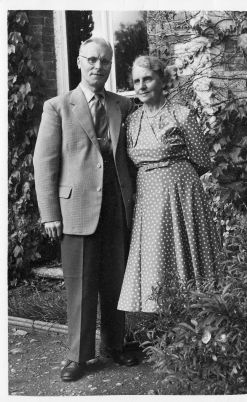
Will and Flo Leatherland
In 1950 he was responsible for the introduction of a Hollerith information processing system at Cadburys, a forerunner of the modern computer system. Will retired in 1962 and went to live in Paington, Devon. Flo died in 1976. Will died in 2000 at the age of 98.
CHARLES LEATHERLAND
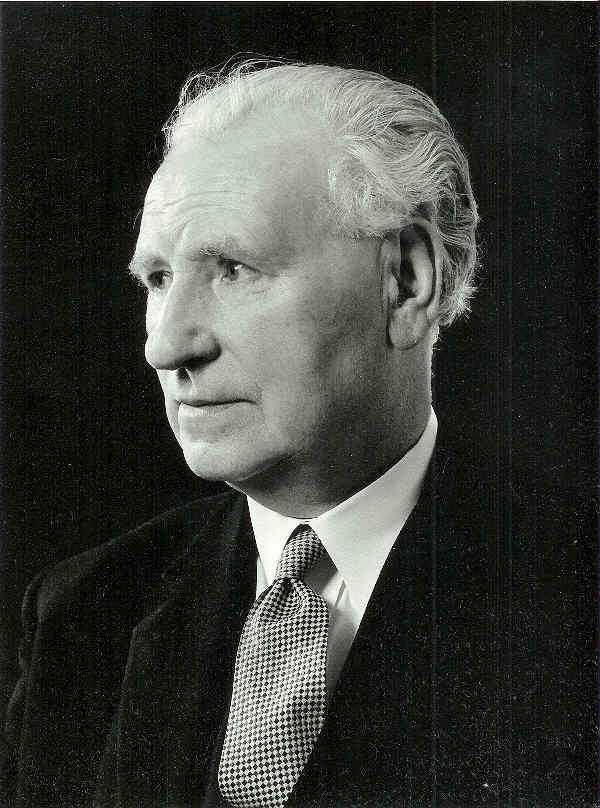
Charles Edward Leatherland was born in Aston, Birmingham in 1898. His mother died when he was 8 years old. In 1914 he joined the Royal Warwickshire Regiment and served in Belgium, France and Germany during WW1. After the war, he joined the Labour Party and became involved in local politics and campaigning in Birmingham. He was a founder member of the National Union of Ex-Servicemen. He became a journalist and moved to Macclesfield, Cheshire as a reporter on the Macclesfield Courier. There he met and married Mary (Molly) Morgan.
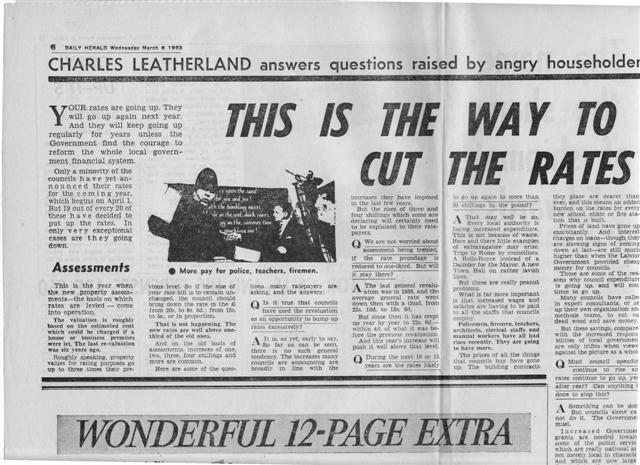
His political career intensified when he moved to London in 1924, having secured a job in the Press Department of Labour Party head office. Five years later he joined the Daily Herald newspaper as a sub-editor. He worked for the Daily Herald until retirement, becoming an Assistant Editor. He was also heavily involved in local and county council politics in Essex where he bought an Old Rectory in 1934.
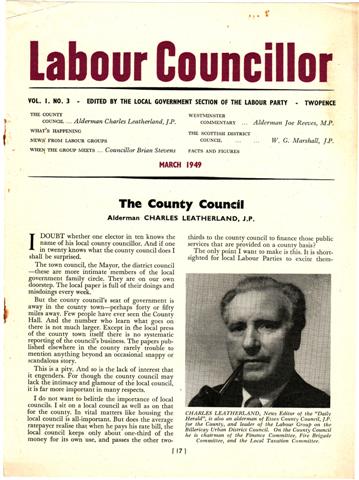
After retirement from journalism, he became a Life Peer in the House of Lords. He was also closely involved in the foundation of Essex University and became its Treasurer. He died in 1992 at the age of 94.
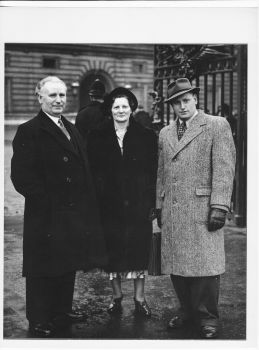
Charles with wife Molly and son John